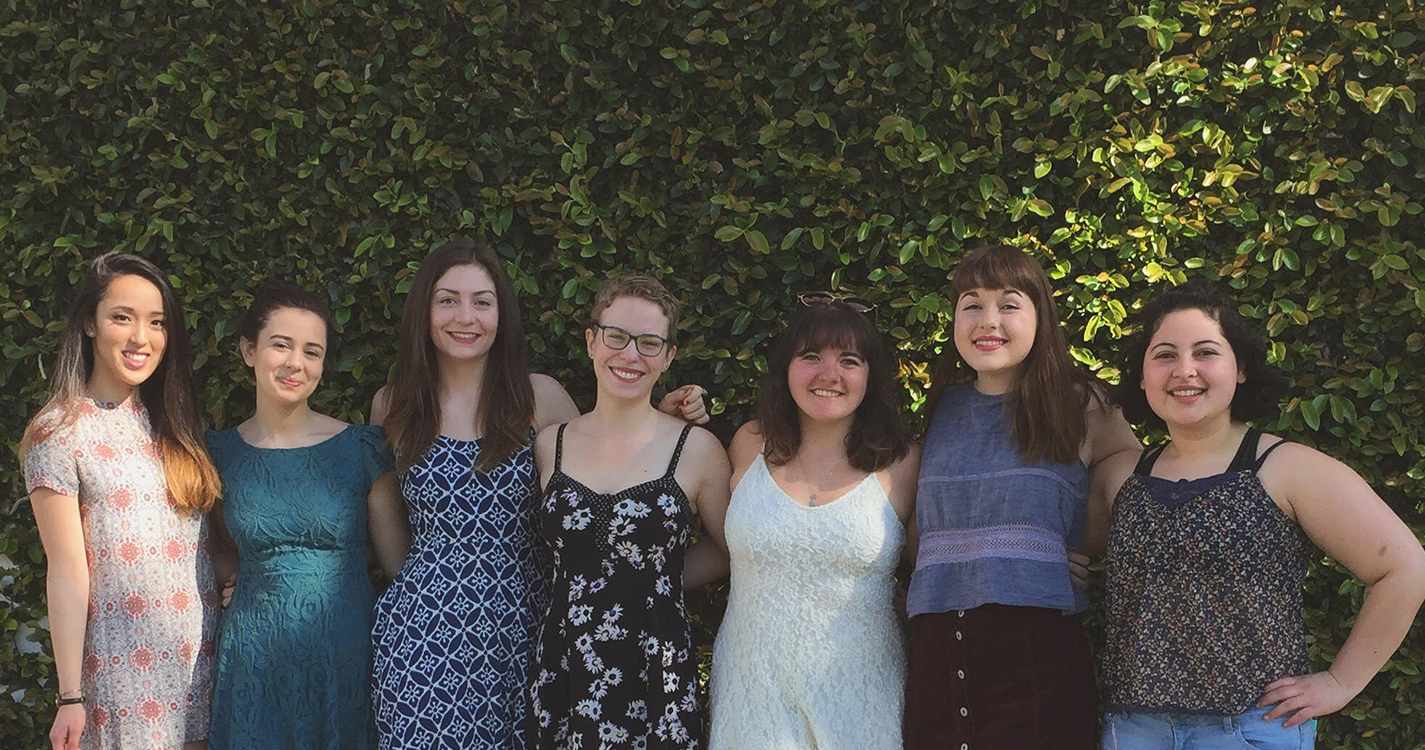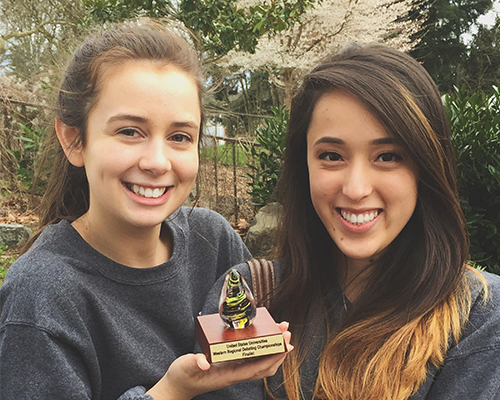The clock is ticking.
A speaker has just announced the debate topic — perhaps it’s the South China Sea, Deflategate, the Affordable Care Act — and Willamette students instantly bolt across an unfamiliar college campus to prepare for the round.
Moments earlier, the students didn’t know the topic, what side they’ll take or their competitors. Now, in the next 15 minutes, they have to rush to find the debate room, frantically come up with an effective defense — and be able to change the focus of their argument at the drop of a hat.
Time’s up. And now the really nerve-wracking part begins: Over the next hour, students working in two-person teams must define, defend and advance different ideas about their newly assigned topic.
Adrenaline can run high for Debate Union students at local and regional tournaments. But that feeling will only ramp up for students April 14–17, when five teams compete at the national tournament in Denver.
Debate captain Quinlyn Manfull ’19, a politics and economics major, says the main goal is to advance into one of the top 32 places. A string of recent successes against top-performers such as Duke and Cornell universities has left team members feeling confident about their chances. Manfull and Jessica Weiss ’18, another captain, also recently won third place at the United States Universities Western Regionals in Tacoma, Washington.
Still, they’re a bit nervous, despite all the prep ahead of a debate — drills, researching and reading as much news as possible. As Manfull says, “You can be thrown anything.”
Longtime debate director Robert Trapp, who is also chair of the civic communication and media department, says this team’s civic activism distinguishes it from others. In general, Willamette teams stand out because of their ethical approach.
“The goal is not to win at any cost,” he says. “Having something to say is more important.”
Debate has a storied history at Willamette. The Debate Union was established in 1856, making it the oldest program in the West. In 1896, after a debate had been arranged at Willamette, The Collegian’s editorial stated, “No kind of public speaking is so important as this. In the pulpit, at the bar, in the legislative hall, on the platform, the power to forcibly defend a principle or refuse an erroneous dogma is a rare accomplishment.”
The program has racked up many honors since then. Willamette students competed at the XV Annual World Debating Championship in Cork, Ireland in 1996, becoming one of five U.S. teams to advance to final rounds before being beaten by teams from Australia and England.
In 2006, a team earned first place in the National Sweepstakes Award, and three years later MaryAnn Almeida ’09 was named the top debater of the national tournament.
The university’s financial support of the program is very strong, Manfull and Weiss say. This fact, coupled with the first-year debate scholarships offered, prompted both to enroll at Willamette.
Debate members learn British Parliamentary style, a popular form practiced on campuses worldwide. Students build critical thinking skills, learn how to communicate effectively and how to handle conflict without taking it personally — at the very least, debate exposes students to different issues.
Participation is flexible. About 30 students this year have made debate their co-curricular activity or a more central part of their college experience. Similar to a sport, they elect captains, receive a .25 credit and travel for events. Students can also can compete with the team at tournaments in South Africa, Russia, Romania and other places around the globe. Foreign students are also invited to visit Willamette to debate.
Debate empowers students and helps them question with confidence. It also strengthens their intellectual artillery through the practice of constant skepticism and critical thinking, even against their own deeply held beliefs. In an increasingly polarized society, says Manfull, it’s more important than ever to understand different perspectives.
“So often you’re given a side of an argument that you would never agree to in the first place,” she says. “Debate has helped me be more open-minded.”
The program can transform students’ lives in ways they didn’t imagine — even by paving the way to Wall Street.
Weiss, an international studies and economics major, says the program helped her land an internship and job offer at one of the largest banking and financial service organizations in the world.
Last summer, she scored a sales and trading analyst internship at HSBC Global Banking and Markets in New York City. She happened to be working on a desk trading the Turkish lira when a faction of the Turkish Armed Forces attempted a coup d’etat in July. She knew exactly how that would impact the currency.
Her broad depth of knowledge impressed her managers, which led to a graduate analyst position in the Global Markets division. She will start after her graduation in December.
“If you’re working in finance, international politics may not be your realm of expertise,” she says. “But as a debater, I have to keep up with world issues in case we get a topic on the Middle East.”
Follow the Debate Union when they take over Willamette’s Snapchat at their upcoming national tournament on April 15.


